Freely Available British and Irish Public Legal Information
[Home] [Databases] [World Law] [Multidatabase Search] [Help] [Feedback]
United Kingdom Statutory Instruments
You are here: BAILII >> Databases >> United Kingdom Statutory Instruments >> The Licensing Act 2003 (Permitted Temporary Activities) (Notices) Regulations 2005 No. 2918
URL: http://www.bailii.org/uk/legis/num_reg/2005/20052918.html
[New search] [Help]
| Made | 19th October 2005 | ||
| Laid before Parliament | 20th October 2005 | ||
| Coming into force | 10th November 2005 |
The Secretary of State makes the following Regulations in exercise of the powers conferred by sections 100(4) and (5), 102(2) and 107(7) of the Licensing Act 2003[1]:
Citation and commencement
1. These Regulations may be cited as the Licensing Act 2003 (Permitted Temporary Activities) (Notices) Regulations 2005 and come into force on 10th November 2005.
Interpretation
2. In these Regulations—
-
(a) "the Act" means the Licensing Act 2003;
(b) "appropriate address" in relation to a counter notice means—
-
(i) the postal address indicated in section 1(8) of the temporary event notice in respect of which the counter notice is given, or
(ii) if there is no such address the postal address indicated in section 1(6) of the notice;
(c) "appropriate e-mail address" in relation to a counter notice means—
-
(i) an e-mail address indicated in section 1(9) of the temporary event notice in respect of which the counter notice is given, or
(ii) if sections 1(8) and 1(9) of the notice have not been completed, an e-mail address indicated in section 1(7) of the notice;
(d) "copy" includes an electronic copy;
(e) "counter notice" means a counter notice under section 107 of the Act;
(f) "ordinary post" means ordinary prepaid first-class or second-class post (with or without special arrangements for delivery);
(g) "relevant premises user" has the same meaning as in section 107(1) of the Act;
(h) "signature" includes an electronic signature within the meaning of section 7 of the Electronic Communications Act 2000[2];
(i) "temporary event notice" has the same meaning as in section 100(1) of the Act.
Form of temporary event notice
3.
—(1) The prescribed form for a temporary event notice is set out in Schedule 1.
(2) A matter appearing in, or required to be stated in the prescribed form in that Schedule (other than a matter mentioned in section 100(5)(a) to (e) of the Act) is a prescribed matter for the purposes of section 100(5) of the Act.
(3) Any other information appearing in, or required to be included in the prescribed form in that Schedule (other than information mentioned in section 100(4)(a) or (b) of the Act) is prescribed information for the purposes of section 100(4) of the Act.
Form of acknowledgement of receipt of temporary event notice
4.
The prescribed form for an acknowledgement of the receipt by a licensing authority of a temporary event notice is the signature of a person authorised to acknowledge such receipt on the authority's behalf appearing in section 10 (entitled "Acknowledgement") of the notice, or of a copy of the notice.
Form of counter notice
5.
The prescribed form for a counter notice is set out in Schedule 2.
Manner of giving counter notice
6.
A counter notice is given in the prescribed manner if it is—
-
(a) delivered to the relevant premises user in person;
(b) left at the appropriate address;
(c) sent to that address by ordinary post; or
(d) sent by e-mail to an appropriate e-mail address.
Richard Caborn
Minister of State Department for Culture, Media and Sport
19th October 2005
The Prescribed form for a temporary event notice is as follows:
[Insert name and address of relevant licensing authority and its reference number (optional)]
Information on the Licensing Act 2003 is available on the website of the Department for Culture, Media and Sport (http://www.culture.gov.uk/alcohol–and–entertainment/default.htm) or from your local licensing authority.
Before completing this notice please read the guidance notes at the end of the notice. If you are completing this notice by hand please write legibly in block capitals. In all cases ensure that your answers are inside the boxes and written or typed in black ink. Use additional sheets if necessary.
You should keep a copy of the completed notice for your records. You must send two copies of this notice to the licensing authority and an additional copy must be sent to the chief officer of police for the area in which the premises are situated. The licensing authority will endorse one of the two copies and return it to you as an acknowledgement of receipt.
I, the proposed premises user, hereby give notice under section 100 of the Licensing Act 2003 of my proposal to carry on a temporary activity at the premises described below.
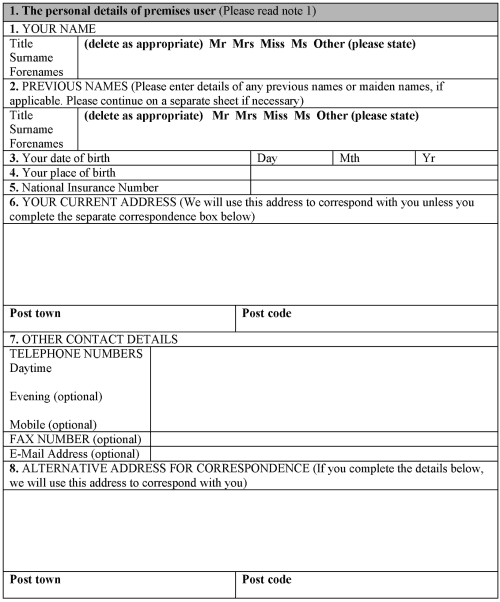

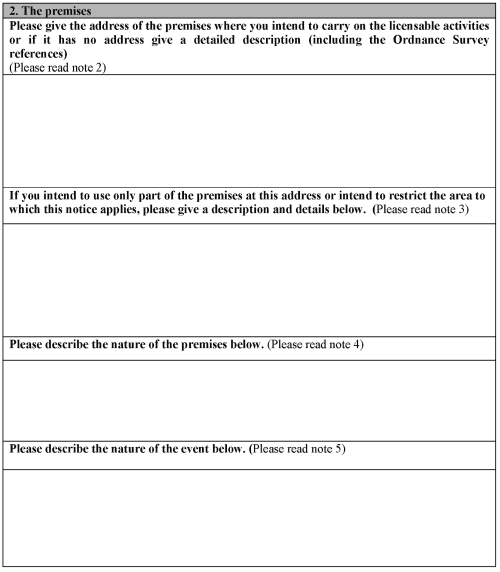

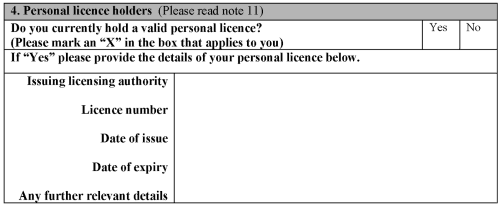
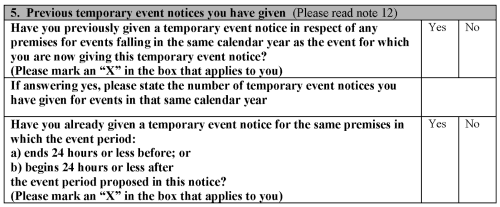



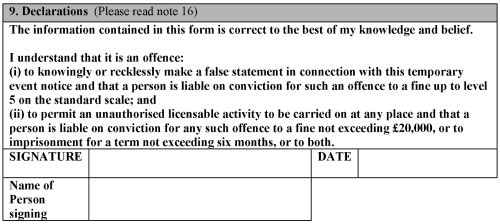

General
In general, only the police may intervene on crime prevention grounds to prevent the occurrence of an event at which permitted temporary activities are to take place or to agree a modification of the arrangements for such an event. However, the licensing authority may intervene of its own volition by issuing a counter notice if the first, second and fourth of the limits set out below would be exceeded. If any of the limits below are breached or if a counter notice has been issued, any licensable activities taking place would be unauthorised and the premises user would be liable to prosecution. The limitations apply to:
-
— the number of times a person (the "premises user") may give a temporary event notice (50 times per year for a personal licence holder and 5 times per year for other people);
-
— the number of times a temporary event notice may be given in respect of any particular premises (12 times in a calendar year);
-
— the length of time a temporary event may last for these purposes (96 hours);
-
— the maximum aggregate duration of the periods covered by temporary event notices at any individual premises (15 days per calendar year); and
-
— the scale of the event in terms of the maximum number of people attending at any one time (a maximum of 499).
For the purposes of determining the overall limits of 50 temporary event notices per personal licence holder (in a calendar year) and of 5 for a non-personal licence holder (in a calendar year), temporary event notices given by an associate or a person who is in business with a premises user (and that business involves carrying on licensable activities) count towards those totals. Note 13 below explains the definition of an "associate".
When permitted temporary activities take place, a premises user must ensure that either:
-
— a copy of the temporary event notice endorsed as acknowledged by the licensing authority is prominently displayed at the premises; or that
-
— the temporary event notice endorsed as acknowledged by the licensing authority is kept at the premises either in his own custody or in the custody of a person present and working at the premises and whom he has nominated for that purpose.
Where the temporary event notice is in the custody of a nominated person, a notice specifying that fact and the position held by that person must be displayed prominently at the premises.
Where neither the temporary event notice nor a notice specifying the nominated person are displayed, a constable or an authorised person (for example, a licensing officer, fire officer or environmental health officer) may require the premises user to produce the temporary event notice for examination. Similarly, where the nominated person has the temporary event notice in his custody, a constable or authorised person may require that person to produce it for examination. Failure to produce the temporary event notice without reasonable excuse would be an offence.
It should also be noted that the following, among other things, are offences under the Licensing Act 2003:
-
— the sale or supply of alcohol to children under 18 years of age (maximum fine on conviction is a fine up to level 5 on the standard scale, currently £5,000);
-
— allowing the sale of alcohol to children under 18 (maximum fine on conviction is a fine up to level 5 on the standard scale, currently £5,000);
-
— knowingly allowing the consumption of alcohol on the premises by a person aged under 18 (maximum fine on conviction is a fine up to level 5 on the standard scale, currently £5,000);
-
— allowing disorderly behaviour on the premises (maximum fine on conviction is a fine up to level 3 on the standard scale, currently £1,000);
-
— the sale of alcohol to a person who is drunk (maximum fine on conviction is a fine up to level 3 on the standard scale, currently £1,000);
-
— obtaining alcohol for a person who is drunk (maximum fine on conviction is a fine up to level 3 on the standard scale, currently £1,000);
-
— knowingly allowing a person aged under 18 to make any sale or supply of alcohol unless the sale or supply has been specifically approved by the premises user or any individual aged 18 or over who has been authorised for this purpose by the premises user (maximum fine on conviction is a fine up to level 1 on the standard scale, currently £200); and
-
— knowingly keeping or allowing to be kept on the premises any smuggled goods which have been imported without payment of duty or which have otherwise been unlawfully imported (maximum fine on conviction is a fine up to level 3 on the standard scale, currently £1,000).
In addition, where the premises are to be used primarily or exclusively for the sale or supply of alcohol for consumption on the premises, it is an offence to allow children under 16 to be present when the premises are open for that purpose unless they are accompanied by an adult. In the case of any premises at which sales or supplies of alcohol are taking place at all, it is an offence for a child under 16 to be present there between the hours of midnight and 5am unless accompanied by an adult. In both instances, the penalty on conviction is a fine not exceeding level 3 on the standard scale, currently £1,000.
Note 1
A temporary event notice may only be given by an individual and not, for example, by an organisation or club or business. The individual giving the notice is the proposed "premises user". Within businesses, clubs or organisations one individual will therefore need to be identified as the proposed premises user.
If you include an e-mail address in section 1(7) or 1(9) the licensing authority may use the address to send any counter notice it is required to give under section 107 of the Licensing Act 2003.
Note 2
For the purposes of the Licensing Act 2003, "premises" means any place. Premises will therefore not always be a building with a formal address and postcode. Premises can include, for example, public parks, recreation grounds and private land.
Note 3
A temporary event notice can be given for part of a building, such as a single room or a plot within a larger area of land. You should provide a clear description of the area in which you propose to carry on licensable activities. This is important as any licensable activities conducted outside the area of the premises protected by the authority of this temporary event notice would be unlawful and could lead to prosecution.
In addition, when holding the proposed event, the premises user would need to be able to restrict the number of people on the premises at any one time when licensable activities are taking place to less than 500.
If more than 499 are on the premises when licensable activities are being carried on, the licensable activities would be unlawful and the premises user would be liable to prosecution. The maximum figure of 499 includes, for example, staff, organisers, stewards and performers.
Note 4
A description of the nature of the premises assists the chief officer of police in deciding if any crime prevention issues are likely to arise. You should state clearly that the premises to be used are, for example, a public house, a restaurant, an open field, a village hall or a beer tent.
Note 5
A description of the nature of the event similarly assists the chief officer of police in making his decision whether or not to make an objection. You should state clearly that the event taking place at the premises would be, for example, a wedding with a pay bar, the supply of beer at a particular farmers' market, a discotheque, the performance of a string quartet, a folk group or a rock band.
Note 6
The licensable activities are:
-
— the sale by retail of alcohol;
-
— the supply of alcohol by or on behalf of a club to, or to the order of, a member of a club;
-
— the provision of regulated entertainment; and
-
— the provision of late night refreshment.
Please refer to Schedules 1 and 2 to the Licensing Act 2003 for fuller details of the definitions and exemptions relating to regulated entertainment and late night refreshment.
Regulated entertainment, subject to specified conditions and exemptions, includes:
-
(a) a performance of a play;
(b) an exhibition of a film;
(c) an indoor sporting event;
(d) a boxing or wrestling entertainment;
(e) a performance of live music;
(f) any playing of recorded music;
(g) a performance of dance;
(h) entertainment of a similar description to that falling within (e), (f) or (g).
Regulated entertainment also includes the provision of "entertainment facilities" for:
-
(a) making music;
(b) dancing; and
(c) entertainment of a similar description to that falling within (a) or (b).
If you are uncertain whether or not the activities that you propose are licensable, you should contact your licensing authority for further advice.
Note 7
The maximum period for using premises for licensable activities under the authority of a temporary event notice is 96 hours (four days).
Note 8
You should state here the times during the event period, for example 48 hours, when you intend to carry on licensable activities. For example, you may not intend to carry on licensable activities throughout the entire 48 hour event period, and may intend to sell alcohol between 8.00 hrs and 23.00 hrs on each of the two days.
Note 9
No more than 499 may be on the premises for a temporary event at any one time when licensable activities are being carried on. If you intend to have more than 499 attending the event, you should obtain a premises licence for the event. Your licensing authority should be able to advise you. The maximum figure of 499 does not just include the audience, spectators or consumers and includes, for example, staff, organisers, stewards and performers who will be present on the premises.
Note 10
If you indicate that alcohol will be supplied only for consumption on the premises, you would be required to ensure that no person leaves the premises with alcohol supplied there. If such a supply takes place, the premises user may be liable to prosecution for carrying on an unauthorised licensable activity. Similarly, if the premises user gives notice that only supplies of alcohol for consumption off the premises will take place, he/she must ensure that alcohol supplied is not consumed on the premises. The premises user is free to give notice that he/she intends to carry on both types of supplies. For this purpose the supply of alcohol includes both of the first two licensable activities listed in note 6 above.
Note 11
The holder of a valid personal licence issued under the Licensing Act 2003 may give up to 50 temporary event notices in any calendar year subject to the other limitations in the 2003 Act. A proposed premises user who holds such a licence should give the details requested.
Note 12
As stated under Note 11 the holder of a valid personal licence holder issued under the Licensing Act 2003 may give up to 50 temporary event notices in any calendar year. An individual who does not hold a valid personal licence may only give 5 temporary event notices in England and Wales within a calendar year. A calendar year is the period between 1 January to 31 December, inclusive, in any year.
If an event straddles two calendar years, it will count against the limits on temporary event notices (12 for each premises, 15 days for each premises, 50 per personal licence holder and 5 for non-holders) for each year, however, only one notice needs to be given.
For the purposes of determining the overall limits of 50 temporary event notices per personal licence holder (in a calendar year) and of 5 for a non-personal licence holder (in a calendar year), temporary event notices given by an associate or a person who is in business with a premises user (and that business involves carrying on licensable activities) count towards those totals. Note 13 below sets out the definition of an "associate".
If a temporary event notice has been given for the same premises, by the same premises user, and would have effect within 24 hours before the start of the event period under the current proposal or within 24 hours after the end of that period, the temporary event notice given would be void and any licensable activities carried on under it would therefore be unlicensed.
For the purposes of determining whether or not the required gap of 24 hours is upheld, temporary event notices given by an associate or a person who is in business with a premises user (and that business involves carrying on licensable activities) count as if they had been given by the premises user himself. Note 13 below sets out the definition of an "associate".
Note 13
An "associate" of the proposed premises user is:
-
(a) the spouse of that person;
(b) a child, parent, grandchild, grandparent, brother or sister of that person;
(c) an agent or employee of that person; or
(d) the spouse of a person within (b) or (c).
For these purposes, a person living with another as that person's husband or wife is to be treated as that person's spouse.
These provisions will be subject to amendment by the Civil Partnerships Act. These amendments are due to take effect from 5th December 2005.
Note 14
It is a requirement that you send two copies of this notice to the licensing authority at least ten working days before the commencement of the proposed licensable activities. The authority will endorse one of the two copies and return it to you as an acknowledgement. This will be important proof that you gave the notice and when you gave it for the purposes of the Act. Some premises may be situated in two licensing authority areas, for example, where a building or field straddles the local authority boundary. Where this is the case, two copies must be sent to each of the licensing authorities identified, together with the appropriate fee in each case. In such circumstances, you need to receive acknowledgements from all the relevant licensing authorities.
One copy must be sent to the chief officer of police for the area in which the premises is situated at least ten working days before the commencement of the proposed licensable activities. Where the premises are situated in two police areas, a further copy will need to be sent to the second police force.
Note 15
Under the Licensing Act 2003, all temporary event notices are given subject to a mandatory condition requiring that where the licensable activities involve the supply of alcohol, all such supplies must be made by or under the authority of the named premises user. If there is a breach of this condition, the premises user and the individual making the supply in question would be liable to prosecution. For this purpose the supply of alcohol includes both of the first two licensable activities listed in note 6 above.
Note 16
It is an offence knowingly or recklessly to make a false statement in, or in connection with, a temporary event notice. (A person is to be treated as making a false statement if he produces, furnishes, signs or otherwise makes use of a document that contains a false statement). To do so could result in prosecution and a fine not exceeding level 5 on the standard scale.
Note 17
You should not complete section 10 of the notice, which is for use by the licensing authority. They will complete this section and return one of the copies that you have sent to them as an acknowledgement of the notice you have given.
The prescribed form for a counter notice is as follows:
On [insert date] the licensing authority received from you, [insert name], a temporary event notice ("the notice") in respect of proposed temporary licensable activities due to take place on [insert date] at [insert address or description of premises]. The licensing authority is satisfied that if the activities were to take place, one of the permitted limits set out in section 107(2), (3), (4) and (5) of the Licensing Act 2003 ("the Act") would be exceeded.
The limit (and subsection) which applies is indicated by an "X" in the following table.
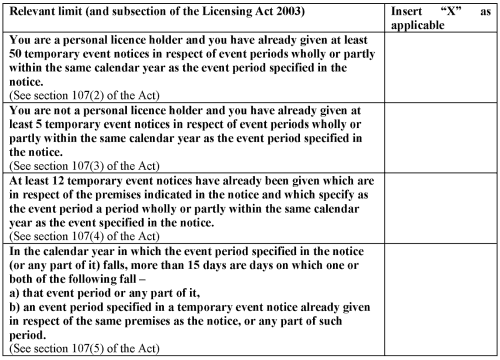
A copy of this counter notice will be sent to the chief officer of police for the area in which the premises specified in the temporary event notice you gave is situated.
The Licensing Act 2003 does not make provision for you to appeal against this counter notice.
Under section 136 of the Licensing Act 2003 a person commits an offence if he carries on a licensable activity on or from any premises otherwise than under and in accordance with an authorisation; or if he knowingly allows a licensable activity to be so carried on. A person convicted of such an offence is liable to imprisonment for a term not exceeding six months or to a fine not exceeding £20,000, or to both.

(This note is not part of the Regulations)
These Regulations prescribe the forms to be used for temporary event notices given by premises users under section 100 of the Licensing Act 2003 (c. 17), and the prescribed matters and information to be contained in such notices. They also prescribe the form for the acknowledgement of the receipt by a licensing authority of a temporary event notice.
In addition the Regulations prescribe the form to be used for counter notices given by licensing authorities under section 107 of the 2003 Act, and the manner in which a counter notice must be given to the premises user.
Notes:
[1] 2003 c. 17. See the definitions of "prescribed" and "regulations" in section 193 of the Act.back
ISBN 0 11 073505 6
